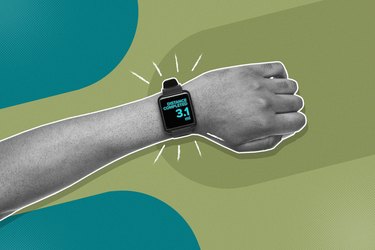
With sedentary lifestyles and self-isolation the new norm, it's more important than ever to take care of your health with regular exercise. If you're cooped up at home and missing the gym, perhaps you've considered going for a run.
"Regular aerobic exercise is extra beneficial right now with the current situation, as it can help manage stress, anxiety, depression and improve sleep quality," exercise physiologist Biara Webster tells LIVESTRONG.com.
Video of the Day
Video of the Day
Ready for the 5K-a-Day Running Challenge?
Some people are taking that regularity extra seriously, committing to running daily — or even running a 5K every day. With a quick search online, you'll find different 5K running challenges, such as the Run 5, Donate 5, Nominate 5 Instagram challenge raising money to fight COVID-19, or fitness influencers documenting their own experiences running daily 5Ks.
The consensus is clear: Running is beneficial for your health. But how much is too much? What actually happens to your body when you run 5 kilometers (or 3.1 miles) day after day? Here's what to expect.
Benefits (and Risks) of Running a 5K Every Day
No doubt, running a 5K every day (or even 5 miles a day) provides a host of health benefits, from elevated mood to improved cardiovascular health. But it also comes with a few risks. Here's what to keep in mind when running every day.
Increase in Muscle Endurance
By running a 5K every day, you're likely to see improvements in your muscle endurance and potentially in the size of the primary muscles used while running, like your quads, hamstrings, glutes, hip flexors and calves.
While there is limited research on what happens to the muscles after running 3.1 miles seven days a week, an April 2014 study in Exercise Sports Science Review got close. Researchers set out to challenge the dogma that cardio doesn't help with muscle growth.
They compared the results of 12-week strength and aerobic training plans in a small group of older adults and concluded that both workout routines led to similar muscle growth. In fact, the evidence was strong enough for the researchers to recommend cardio as an effective countermeasure for muscle loss due to age.
However, if your goal is building muscle size, called hypertrophy, you'll need to incorporate strength training, too. In a February 2019 analysis in Sports Medicine, researchers reviewed the current evidence on the differences in muscle growth from aerobic and anaerobic forms of exercise. As expected, anaerobic forms of exercise, like weight lifting, promoted more muscle growth than cardio workouts.
Potential for Better Joint Health
There is a common perception that running increases your risk of joint issues, such as osteoarthritis, more so than walking and other lower-impact forms of exercise, especially when running long distances or without enough days off.
While running a 5K every day isn't necessarily directly beneficial for your joints, some running statistics show runners have a lower risk of joint issues.
In a July 2013 study in Medicine and Science in Sports and Exercise, researchers found that 4.75 percent of walkers but just 2.68 percent of runners reported osteoarthritis over a six- to seven-year period. Just under 1 percent, 0.8, of walkers had hip replacements, while 0.35 of runners did, possibly because the runners had lower average body weights, and lower body weight puts less stress on the joints.
While a daily 5K challenge could cause problems with your joints — especially if you're carrying a little extra weight and you're new to running, according to a May 2013 study in the Orthopaedic Journal of Sports Medicine — you shouldn't avoid it solely in fear of joint issues. Just be aware of your fitness level and start slowly.
"To decrease the risk of injuries to newbies, I would advise running every second day, alternating your program with strength training, especially of the core and legs if running is your goal, and/or alternative cardiovascular exercises, like swimming or cycling," Webster says.
Related Reading
Improvement in Cardiovascular Fitness
Cardio exercise, including running, is particularly effective at improving your, well, cardiovascular fitness. Cardiovascular fitness refers to your body's ability to take in and utilize oxygen while exercising; it's the result of your lungs, muscles, heart and blood working in sync.
The more cardio you do, and the longer you do it, the more your cardiovascular fitness will improve, according to June 2015 study in the Journal of the American Heart Association.
"Daily running will definitely increase your fitness by increasing the strength of your heart, the amount of oxygen your lungs can take in and the time your muscles can continue the consistent contractions," Webster says. "Although, if you are already running daily and not challenging yourself through intensity or duration, it's more likely to have a maintenance effect."
In other words, if you're already running regularly at a steady pace over similar distances, daily 5Ks will help you maintain your current level of fitness. But if you haven't been running, "theoretically you would expect significant improvements in your cardio," she says. "The only way for the body to improve is to be challenged appropriately."
Possible Weight Loss
If you run a 5K every day, there's a good chance you'll lose weight. Increasing running distance by 5 kilometers was associated with weight loss in both men and women in an April 2013 study in Medicine and Science in Sports and Exercise. And doing cardio five days a week for 10 months helped people lose weight even when they had no strict restrictions on their diet, according to a September 2013 study in Obesity.
That's likely because of a fundamental truth of weight loss: When you burn more calories than you take in, you start to shed extra pounds. By running a 5K every day, you will increase the number of calories you burn and therefore increase the likelihood that you will lose weight if you're also making smart choices in the kitchen.
The amount of calories you burn running 3.1 miles depends on several factors, such as your age, weight, conditioning, whether you're on a treadmill and, of course, how fast you're running.
The American Council on Exercise's Physical Activity Calorie Counter estimates that a 150-pound person running at 5 miles per hour will burn around 360 calories over 5 kilometers. Burning 360 calories every day can certainly help you lose weight. However, if you're overeating, you may not see noticeable results.
Boost in Mood
Running a 5K every day might have positive effects on your mood and mental health. Getting more physical activity appears to protect against developing depression, with any activity being better than none, according to a January 2019 study in the Journal of the American Medical Association.
Just 15 minutes of an intense, heart-pumping activity such as fast-paced running or an hour of more steady-state cardio like jogging was linked with a lower risk of depression in the study. While depression is a complicated condition and has no simple cure, running a daily 5K is definitely a form of exercise that could help improve your overall mood and mental wellbeing.
Better Sleep Quality
Daily 5Ks might even help you sleep better. Regular exercise (including running) was found to improve sleep quality in 29 out of 34 studies analyzed in a 2014 review in the American Journal of Lifestyle Medicine.
Just make sure to leave plenty of time to cool down before hitting the hay. A tough running workout within an hour of bedtime has been shown to affect your sleep quality and your ability to fall asleep, according to a February 2019 review in Sports Medicine.
What About Running 5 Miles a Day?
If you're looking to push yourself beyond a 5K a day, you might consider running 5 miles a day (a little more than 8K). First, you want to make sure you have a solid base of aerobic fitness. That means you've been running 3 to 5 miles a few times a week for a couple months.
A daily 5-mile run has essentially the same benefits as outlined above. But with increasing your mileage or the frequency of your runs comes the increased risk of injury. Doing the same movement over and over again (like you do when you're running), can lead to overuse injuries. And introducing new routes or terrain may lead to injuries from a fall.
As a general rule of thumb, increase your weekly running mileage by no more than 10 percent. So that means, if you're currently running a 5K a day (about 21K or 13 miles), you'll need to work up to 5 miles a day by starting with 23K (14 miles) and increasing from there.
Bottom Line: Run, but Start Slowly
Running a 5K every day can be a great way to improve your cardiovascular health, strengthen and maintain your muscles and keep yourself sane while you're stuck at home, as long as you're not brand-new to running. Plus, when paired with a healthy diet, it may even help you lose weight.
But for new runners, a daily 5K is a big goal. Take your time building toward that achievement. If you're completely new, start with a mix of running and walking. Then, gradually up your running mileage.
Maybe you start with just 1 kilometer (0.62 miles). Over time, build up to running 5 kilometers relatively comfortably. Then, try a 5K twice a week, then three times a week, until you are able to run a 5K every day.
Remember to listen to your body, too. Weight-loss plateaus, fatigue, stress and trouble sleeping could all be signs you need a rest day — or that you should at least make tomorrow's 5K a little less intense.
- Obesity: "Aerobic exercise alone results in clinically significant weight loss for men and women: Midwest Exercise Trial-2"
- ACE: "Physical Activity Calorie Counter"
- JAHA: "Effects of Exercise Training on Cardiorespiratory Fitness and Biomarkers of Cardiometabolic Health: A Systematic Review and Meta‐Analysis of Randomized Controlled Trials"
- Sports Medicine: "Does Aerobic Training Promote the Same Skeletal Muscle Hypertrophy as Resistance Training? A Systematic Review and Meta-Analysis"
- MSSE: "Effects of Running and Walking on Osteoarthritis and Hip Replacement Risk"
- MSSE: "Greater Weight Loss from Running than Walking during 6.2-yr Prospective Follow-up"
- JAMA Psychiatry: "Assessment of Bidirectional Relationships Between Physical Activity and Depression Among Adults"
- AJLM: "Interrelationship between Sleep and Exercise: A Systematic Review"
- Sports Medicine: "Effects of Evening Exercise on Sleep in Healthy Participants: A Systematic Review and Meta-Analysis"
- OJSM: "Predictors of Running-Related Injuries Among 930 Novice Runners"
Was this article helpful?
150 Characters Max
0/150
Thank you for sharing!
Thank you for your feedback!



